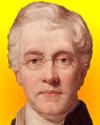 (source)
(source)
|
Sir Charles Bell
(12 Nov 1774 - 28 Apr 1842)
Scottish anatomist and surgeon whose book, New Idea of Anatomy of the Brain (1811), has been called the “Magna Carta of neurology.” He identified that the anterior roots of the spinal nerves are motor in function, while the posterior roots are sensory.
|
Science Quotes by Sir Charles Bell (5 quotes)
I took this view of the subject. The medulla spinalis has a central division, and also a distinction into anterior and posterior fasciculi, corresponding with the anterior and posterior portions of the brain. Further we can trace down the crura of the cerebrum into the anterior fasciculus of the spinal marrow, and the crura of the cerebellum into the posterior fasciculus. I thought that here I might have an opportunity of touching the cerebellum, as it were, through the posterior portion of the spinal marrow, and the cerebrum by the anterior portion. To this end I made experiments which, though they were not conclusive, encouraged me in the view I had taken. I found that injury done to the anterior portion of the spinal marrow, convulsed the animal more certainly than injury done to the posterior portion; but I found it difficult to make the experiment without injuring both portions.
— Sir Charles Bell
Idea of a New Anatomy of the Brain (1811), 21-22.
In France, where an attempt has been made to deprive me of the originality of these discoveries, experiments without number and without mercy have been made on living animals; not under the direction of anatomical knowledge, or the guidance of just induction, but conducted with cruelty and indifference, in hope to catch at some of the accidental facts of a system, which, is evident, the experimenters did not fully comprehend.
— Sir Charles Bell
An Exposition of the Natural System of the Nerves of the Human Body (1824), 2-3.
Man has two conditions of existence in the body. Hardly two creatures can be less alike than an infant and a man. The whole fetal state is a preparation for birth ... The human brain, in its earlier stage, resembles that of a fish: as it is developed, it resembles more the cerebral mass of a reptile; in its increase, it is like that of a bird, and slowly, and only after birth, does it assume the proper form and consistence of the human encephalon.
— Sir Charles Bell
Attributed.
On laying bare the roots of the spinal nerves, I found that I could cut across the posterior fasciculus of nerves, which took its origin from the posterior portion of the spinal marrow without convulsing the muscles of the back; but that on touching the anterior fasciculus with the point of a knife, the muscles of the back were immediately convulsed.
— Sir Charles Bell
Idea of a New Anatomy of the Brain (1811, 22.
The cerebrum I consider as the grand organ by which the mind is united to the body. Into it all the nerves from the external organs of the senses enter; and from it all the nerves which are agents of the will pass out.
— Sir Charles Bell
Idea of a New Anatomy of the Brain (1811), 27.
See also:
- 12 Nov - short biography, births, deaths and events on date of Bell's birth.
- The Life and Labours of Sir Charles Bell, by Amédée Pichot. - book suggestion.
 In science it often happens that scientists say, 'You know that's a really good argument; my position is mistaken,' and then they would actually change their minds and you never hear that old view from them again. They really do it. It doesn't happen as often as it should, because scientists are human and change is sometimes painful. But it happens every day. I cannot recall the last time something like that happened in politics or religion.
(1987) --
In science it often happens that scientists say, 'You know that's a really good argument; my position is mistaken,' and then they would actually change their minds and you never hear that old view from them again. They really do it. It doesn't happen as often as it should, because scientists are human and change is sometimes painful. But it happens every day. I cannot recall the last time something like that happened in politics or religion.
(1987) -- 


